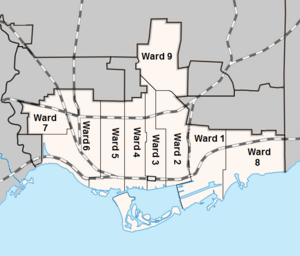Municipal elections were held in Toronto, Ontario, Canada, on January 2, 1950. This was the last time election were held in January, as a ballot measure passed changing the election date to the first Monday in December. This attempt to increase turnout went into effect immediately and an election was held December 4, 1950. The central issue of the campaign was whether to legalize sport on Sundays, with Controller Allan Lamport the main proponent. A referendum was held on the subject, and it passed by a slim margin.
Municipal elections were held in Toronto, Ontario, Canada, on January 1, 1947. With little serious opposition Robert Hood Saunders was re-elected as mayor.
Municipal elections were held in Toronto, Ontario, Canada, on January 1, 1945. Controller Robert Hood Saunders defeated incumbent Frederick J. Conboy to be elected mayor.
Municipal elections were held in Toronto, Ontario, Canada, on January 1, 1944. Incumbent Frederick J. Conboy defeated Controller Lewis Duncan. The election was a notable defeat for the Co-operative Commonwealth Federation as it lost all representation on city council.
Municipal elections were held in Toronto, Ontario, Canada, on January 1, 1940. Incumbent Ralph Day was re-elected mayor. The election saw little change with all incumbent councillors and Board of Control members being reelected.
Municipal elections were held in Toronto, Ontario, Canada, on January 2, 1939. Incumbent Ralph Day was re-elected mayor over former lawyer Lewis Duncan.
Municipal elections were held in Toronto, Ontario, Canada, on December 6, 1937. Ralph Day was elected mayor defeating incumbent William D. Robbins.
Municipal elections were held in Toronto, Ontario, Canada, on December 7, 1936, after being moved up from the traditional New Year's Day vote. William D. Robbins was easily elected mayor to his first full term in office.
Municipal elections were held in Toronto, Ontario, Canada, on January 1, 1936. Sam McBride was elected mayor in a three-way race in which incumbent James Simpson finished third.
Municipal elections were held in Toronto, Ontario, Canada, on January 1, 1935. James Simpson won a surprise victory in the mayoral campaign to become the first socialist candidate elected to the office.
Municipal elections were held in Toronto, Ontario, Canada, on January 2, 1933. William James Stewart was elected to his third term by the largest margin in city history.
Municipal elections were held in Toronto, Ontario, Canada, on January 1, 1932.
Municipal elections were held in Toronto, Ontario, Canada, on January 1, 1931. William James Stewart was elected mayor after winning a close contest again former mayor Sam McBride.
Municipal elections were held in Toronto, Ontario, Canada, on January 1, 1930. In a close mayoral election Bert Wemp ousted two term incumbent Sam McBride. The main issue of the election was a proposed downtown beautification scheme that would have rebuilt roads in the core. The proposal was rejected in a referendum after voters in the suburbs voted against it. McBride was the plan's leading proponent, and its rejection hurt his reelection bid.
Municipal elections were held in Toronto, Ontario, Canada, on January 1, 1928. Sam McBride was elected mayor, defeating incumbent Thomas Foster by a wide margin.
Municipal elections were held in Toronto, Ontario, Canada, on January 1, 1926. Thomas Foster was reelected mayor.
Municipal elections were held in Toronto, Ontario, Canada, on January 1, 1925. Thomas Foster was elected mayor ousting incumbent Wesley Hiltz. The election included a referendum where voters passed a motion in favour of building a new water plant. This eventually became the R. C. Harris Water Treatment Plant.
Municipal elections were held in Toronto, Ontario, Canada, on January 1, 1924. Wesley Hiltz was elected mayor defeating two prominent challengers.
Municipal elections were held in Toronto, Ontario, Canada, on January 1, 1913. H.C. Hocken was elected to his first full term as mayor.



